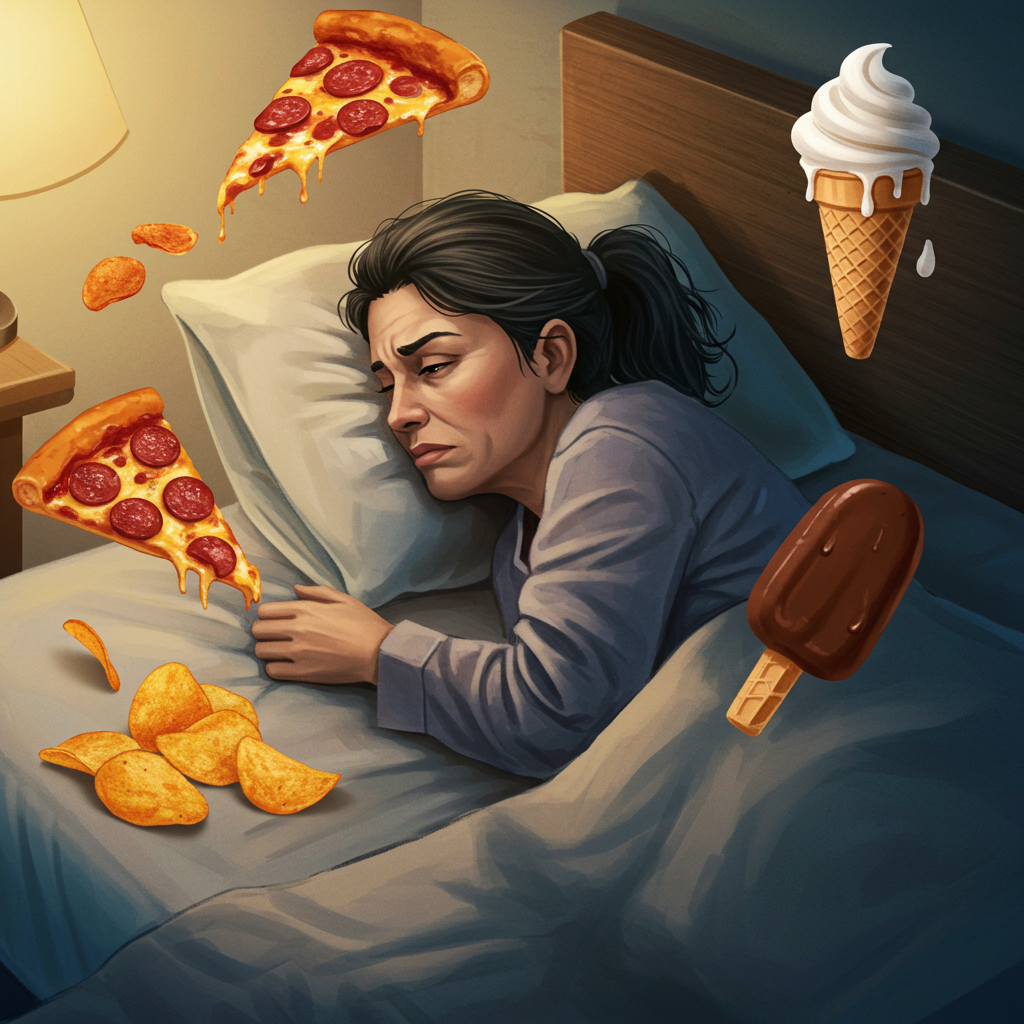Ever wonder why some nights you toss and turn, or vivid, unsettling dreams plague your sleep? The surprising culprit might be sitting right on your dinner plate. New research is strengthening the long-suspected link between the foods we eat and the quality of our sleep and dreams, suggesting that everyday items could be sabotaging your rest.
This isn’t just old wives’ tales anymore. Scientists are now finding evidence that certain dietary choices, particularly those that trigger digestive issues, can significantly disrupt sleep patterns and influence what goes on in your head once you drift off. Understanding how diet and sleep interact is key to improving both your nightly rest and overall well-being.
The Dairy-Nightmare Connection: Probing the “Cheese Dream” Myth
For generations, people have pointed the finger at late-night snacks, especially cheese, as the cause of unsettling dreams. While dismissed as folklore for a long time, recent scientific investigation is beginning to uncover a plausible explanation. A study led by Dr. Tore Nielsen at Université de Montréal, published in Frontiers in Psychology, surveyed over 1,000 university students about their sleep habits, dreams, and perceived links between food and sleep.
The findings offer compelling support for the folk belief, at least for a specific group. Researchers found a strong association between lactose intolerance and the severity of nightmares. This link wasn’t just a correlation; it appeared tied to the physical discomfort experienced by lactose-intolerant individuals after consuming dairy.
Lactose Intolerance: More Than Just Tummy Trouble
The study highlighted that participants with lactose intolerance who suffered significant gastrointestinal (GI) symptoms during the night reported worse nightmares and poorer overall sleep quality. This makes intuitive sense: bodily sensations, particularly discomfort, can permeate our dreams. If your gut is churning or you’re experiencing bloating and gas while you’re trying to sleep, that physical distress could easily translate into a disturbed mental state during REM sleep, the stage where most vivid dreams and nightmares occur.
Digestive discomfort isn’t just inconvenient; it can actively disrupt sleep architecture. Conditions like bloating and gas, which are common symptoms of lactose intolerance, can cause physical unrest that leads to waking up or shallower sleep stages. Other dietary issues can also cause these symptoms. For instance, too much salt leads to water retention and bloating, which can feel uncomfortable when lying down and has been directly linked to restless sleep. Similarly, rapid increases in fiber intake from foods like legumes (think hummus) can cause excess gas production through fermentation, also leading to discomfort. When sleep is fragmented or disturbed by physical symptoms, the content and emotional intensity of dreams can be negatively affected, potentially leading to more frequent and severe nightmares.
Beyond Dairy: Other Foods & Factors Affecting Sleep & Dreams
While lactose intolerance showed a strong link in the study, the broader relationship between diet and sleep quality remains complex. However, the research and other expert insights suggest that various food choices and related factors can influence how well you sleep and the nature of your dreams.
High-Fat & Spicy Foods
Some participants in the study, alongside dairy, blamed sweets and spicy foods for causing more bizarre or unsettling dreams. While the direct link wasn’t as robust as with lactose intolerance, it aligns with the idea that anything causing digestive upset before bed can be problematic. High-fat foods, for example, slow down gastric emptying. This means food sits in your stomach longer, potentially leading to indigestion or discomfort that interferes with sleep onset or quality. Spicy foods can also trigger heartburn or indigestion in sensitive individuals, similarly disrupting restful sleep.
The Salt Factor
Beyond dairy, excessive sodium intake is another dietary habit proven to affect sleep. Eating too much salt, especially later in the day, leads to the body retaining excess fluid. This water retention causes bloating and swelling, which can be physically uncomfortable. High salt intake also increases thirst, potentially leading to frequent nighttime awakenings to drink water or use the bathroom. WebMD reports that consuming too much salt before bed can directly cause restlessness and a feeling of not being rested upon waking.
Fiber & Legumes
Fiber is essential for digestive health, but consuming large amounts too quickly or eating specific types of fiber found in legumes can cause significant gas and bloating. This is because gut bacteria ferment certain carbohydrates that the body can’t digest, producing gases like methane and hydrogen. While introducing fiber gradually helps build tolerance, eating a massive, fiber-rich meal right before bed could lead to uncomfortable gassiness that disrupts sleep, potentially influencing dream content.
Stress, Sleep Habits, & Digestion
It’s a two-way street: diet affects sleep, but sleep and other lifestyle factors also impact digestion and, consequently, sleep quality and dreams. Experts note that poor sleep itself can disrupt the balance of gut bacteria, leading to more gas and digestive issues. High stress levels also negatively impact the digestive system, often slowing things down or causing increased acidity, both of which can contribute to gas, bloating, and discomfort that interferes with sleep. Even simple habits like talking while eating or chugging water from a bottle can lead to swallowing excess air, resulting in gas that could disturb rest. Conditions like sleep apnea, causing mouth breathing or improper use of CPAP machines, can also lead to swallowing air and experiencing uncomfortable gas.
Eating for Better Sleep: What Science Suggests
If certain foods can hurt your sleep, can others help? Absolutely. While avoiding triggers is crucial, incorporating foods known to support sleep mechanisms can be beneficial. The key is to look for foods containing melatonin, the hormone that regulates your sleep-wake cycle, or tryptophan, an amino acid your body converts into melatonin and serotonin.
Melatonin & Tryptophan-Rich Foods
Research suggests that eating foods high in these compounds can modestly increase their levels in your body, potentially aiding sleep. Tart cherries and tart cherry juice have shown promise in studies, increasing melatonin levels and improving sleep duration and quality. Kiwi fruit is another standout, rich in both melatonin and serotonin; studies suggest eating two kiwis before bed can significantly enhance sleep. Other foods containing natural melatonin include nuts, seeds, milk, eggs, and whole grains. Tryptophan-rich foods include milk (explaining the warm milk tradition), turkey, cheese, fish, and oats. Consuming these foods a couple of hours before bedtime might help signal your body that it’s time to rest.
Timing Your Meals for Rest
Beyond what you eat, when you eat matters for sleep. Eating a heavy meal, especially one high in fat or spice, immediately before lying down can invite digestive issues that disrupt sleep. Allowing a buffer of two to three hours between your last substantial meal and bedtime gives your body time to process food and minimize potential discomfort. Lighter, sleep-supportive snacks like a small bowl of oats, a handful of nuts, or a kiwi might be better choices closer to bedtime.
What This Means for You: Practical Takeaways
The connection between diet, sleep, and dreams is becoming clearer. It’s not just about avoiding late-night pizza; it involves understanding how your digestive health impacts your ability to rest deeply.
Here are some actionable steps based on the research:
Listen to Your Body: Pay attention to how specific foods make you feel, especially a few hours after eating and the next morning. Do certain foods consistently precede poor sleep or vivid dreams?
Investigate Sensitivities: If you suspect lactose intolerance or other food sensitivities are causing digestive issues, consider consulting a healthcare professional for testing or guidance on elimination diets. Addressing these can significantly improve both gut health and sleep.
Prioritize Digestive Comfort: Focus on a balanced diet that supports healthy digestion. Gradually increase fiber intake, stay hydrated, manage stress, and consider factors like chewing food thoroughly.
Time Your Meals: Avoid large, heavy meals close to bedtime. Opt for lighter, easily digestible options if you need a late-night snack.
Focus on Overall Diet Quality: The study found that individuals with less healthy diets reported more negative dreams and poorer dream recall. Prioritizing nutritious, whole foods supports overall health, including gut health and sleep regulation.
Practice Good Sleep Hygiene: Diet is one piece of the puzzle. Maintaining a consistent sleep schedule, creating a relaxing bedtime routine, and ensuring a dark, quiet sleep environment are equally crucial for restful sleep.
Seek Professional Help: If you experience persistent sleep problems or severe nightmares, consult a doctor. There could be underlying medical conditions beyond diet that need addressing.
By being mindful of the complex interplay between your diet and your sleep, you can make informed choices that pave the way for more restful nights and perhaps even sweeter dreams.
Frequently Asked Questions
Can eating dairy before bed really cause nightmares?
Yes, according to a study published in Frontiers in Psychology*, there’s a strong link between lactose intolerance and increased nightmares. For individuals with lactose intolerance, consuming dairy can lead to significant gastrointestinal discomfort like bloating and gas during the night. This physical distress can disrupt sleep quality and may influence the content of dreams, potentially resulting in more severe nightmares.
What other foods might negatively impact my sleep or dreams?
Besides dairy for those with lactose intolerance, research suggests that any food causing significant digestive discomfort can disrupt sleep. This includes spicy foods, high-fat meals (which slow digestion), and potentially foods high in certain fibers (like legumes) if consumed rapidly in large amounts, causing gas. High salt intake can also cause bloating and increased nighttime thirst, disrupting sleep.
What kind of foods should I eat to improve my sleep?
Focus on foods containing natural melatonin or tryptophan. Melatonin-rich foods include tart cherries, kiwi fruit, nuts, seeds, milk, and eggs. Tryptophan, which your body converts to melatonin and serotonin, is found in milk, turkey, fish, cheese, and oats. Eating these foods in moderation a couple of hours before bed, combined with good sleep hygiene, may help support healthy sleep cycles.
Conclusion
The emerging science backs up what many have suspected for years: what you eat can indeed influence how you sleep and dream. While the link is particularly strong for individuals with lactose intolerance experiencing digestive issues, it highlights a broader principle: a healthy gut is often key to restful sleep. By paying attention to how your body reacts to different foods, timing your meals thoughtfully, and focusing on a balanced diet that supports digestive health, you can take meaningful steps toward reducing sleep disruptions and potentially influencing your dreamscape for the better. Understanding your unique dietary sensitivities and making conscious food choices can unlock the door to more peaceful and restorative nights.
References
- www.newsweek.com
- www.eatingwell.com
- www.webmd.com
- vegnews.com
- <a href="https://www.bbc.co.uk/food/articles/foodmelatoninsleep”>www.bbc.co.uk



